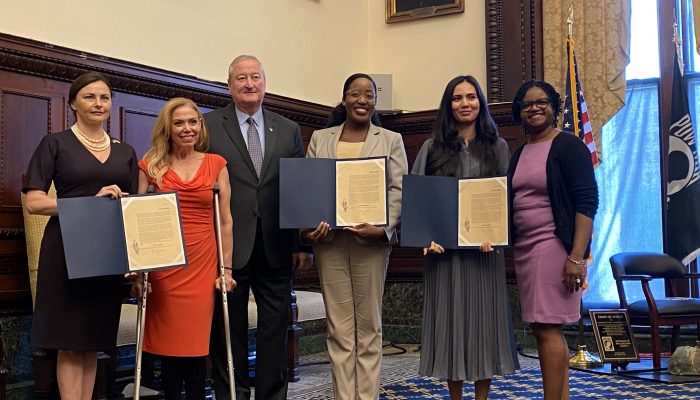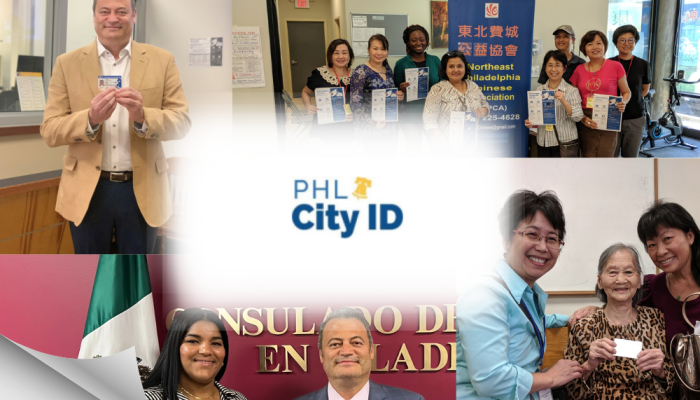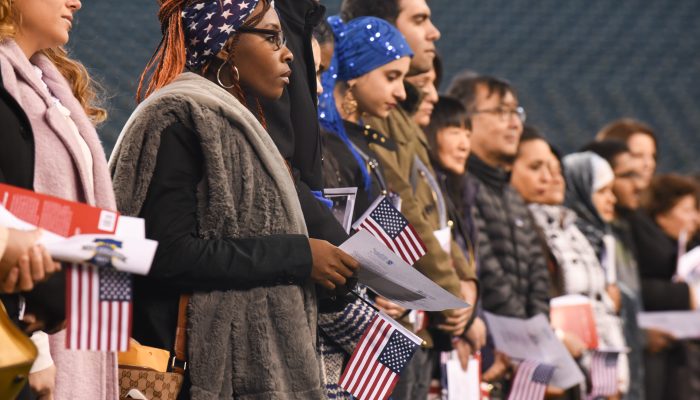This blog post was written by guest bloggers: Gretchen Shanfeld and Cathryn Miller-Wilson
In the first months of 2022, more than 100 million individuals were displaced worldwide as a result of persecution, conflict, violence, or human rights violations, the highest ever on record. This is an increase of 10.7 million people displaced from the end of the previous year. The crises in Haiti, Afghanistan, and Ukraine made this a particularly difficult year but there are also those who have remained displaced for years, even decades including those fleeing Syria, the Democratic Republic of Congo, South Sudan, and many other countries across the world.
The United States has been a welcoming safe haven for refugees fleeing conflict and persecution since its founding in 1776. In fact, most current Americans, with the exception of Native Americans and African Americans, owe their citizenship to the journey of their ancestors who fled persecution, famine, and hardship to settle in the new world. Over three million displaced people have relocated to the United States since 1975. Refugee resettlement efforts peaked in 1980 when the country resettled over 200,000 refugees, most of whom were fleeing Communist Vietnam. But as recently as the Fall of 2021, the US welcomed over 70,000 Afghans fleeing the Taliban takeover of Afghanistan. Additionally, the US has pledged to support 100,000 Ukrainians fleeing Russia’s invasion.
These numbers may seem overwhelming, but they are dwarfed by comparison to the population shrinkage occurring all over the United States. This is the result of a more than ten-year birth rate decline, rising mortality rates due to gun violence and young immigrants and Americans leaving this country as a result of ever harsher and less welcoming policies in the last ten years. This confluence of circumstances has led to the staffing crises in every industry that we face today as well as inflation.
About Welcoming
The benefits of welcoming are clear. Refugees are vital to the U.S. labor market by filling needed jobs and creating jobs through entrepreneurship. One study found that in Southeast Michigan, refugees were responsible in 2016 for $229.6 million to $295.3 million in economic activity and for creating 1,800 to 2,300 jobs. This includes refugee entrepreneurs, whose businesses generated $70 million to $90 million in economic benefits, along with 319 to 410 jobs. Continued refugee resettlement can help spur economic growth around the country, including in the Greater Philadelphia region.
In addition to highlighting the benefits of welcoming, we also want to highlight the needs – and how they are being met. Migration for any reason is traumatic, migrating because of persecution, war and economic crises means that something traumatic occurred in the country of origin that was so serious it caused a person to leave their home and everything they have ever known for an unknown future. Every refugee, therefore, has this in common with one another – fear, anxiety, depression and extreme courage, resilience, and determination. Recognizing this, providing services to address and acknowledge the former allows the latter qualities to thrive.
Refugees also need immediate financial support. Because they have fled, with rare exceptions they have nothing but the clothes on their backs. Providing temporary income ensures a sturdy future for a refugee who is on their feet, earning their own income and paying taxes into the economy between three and six months after their arrival in the United States. The taxes paid by the refugee once they are working more than pays back the investment of three to six months support.
Of course, refugees, as described above, come from all over the world. Therefore, cultural and language adjustment is also needed. While every refugee is different – some are well educated and others are not literate in their language of origin – they are able through English as Second Language classes to learn to communicate fairly quickly, even if the communication can sometimes be bumpy. The United States is unique when compared with countries in South America, Europe, Asia, and Africa, in that it is framed on two sides by oceans. Countries on these other landmasses are framed by other countries which speak other languages. So, refugees from almost anywhere else are often multi-lingual, speaking several dialects as well as languages. English, for refugees, is often a third, fourth, or even fifth language. So, while learning new languages can be quite difficult, it is important for Americans to understand that being mono-lingual is unique to this country.
When refugees arrive in the United States, unsurprisingly, they are vulnerable and have multiple needs. However, meeting those needs not only results in welcomed neighbors but also enhanced and enlivened communities. Our agencies engage in refugee resettlement work, among other services that we provide, because we know firsthand how much resettlement brings to our city.
Learn More About Our Agencies
Created in 1921 to assist immigrant women in acquiring language proficiency and gaining employment, NSC has served as a beacon of hope and support for vulnerable immigrants in the greater Philadelphia region for the last 100 years. Since its founding, NSC has expanded and transformed to meet the increasingly complicated needs of immigrants and refugees. Our mission is to welcome and empower immigrants to thrive in our communities and pursue a just future. More information about our work and how to access our services is available on our website here: www.nscphila.org.
HIAS Pennsylvania was founded in 1882 by Jews to rescue Jews from terrorist attacks in Eastern Russia. In the 1970’s we began serving refugees of all faiths and backgrounds and alongside the resettlement services that we provided we provided immigration legal services as it became more and more difficult for immigrants to remain here or to come here. Today, HIAS Pennsylvania’s largest division is our immigration legal services division in recognition of the fact that so many fleeing persecution are unable to obtain refugee status without legal assistance. More information about our mission, our work, and how to access our services is available on our website here: www.hiaspa.org.




